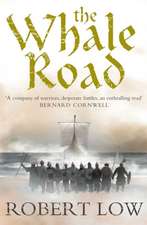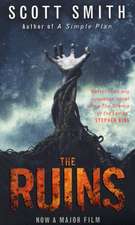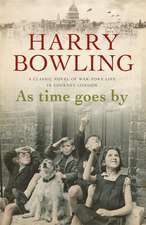Living on Fire: Stories
Autor Virginia Hamilton Adairen Limba Engleză Paperback – 31 oct 2009
All the poems in Living on Fire create their own small worlds. During a long-ago trip down the Mississippi, the author recalls, "Sometimes our waterways became narrow and dim, dark mirrors/under live-oak branches hung with Spanish moss and snakes." A new love affair brings "this nighttime madness/in the backseat of a roadster." Later, she remarks with almost as much wonder as sadness, "Sightless,/I have become a stranger to my own person." Together, these poems articulate a sensibility at once distinctive and universal. Virginia Hamilton Adair has taken the specificities of her own sometimes joyous, sometimes tragic life and transformed them into powerful celebrations and elegies whose beauty and profundity will affect everyone who reads them. Even in the midst of despair, this is a poet whose work, in its sustained passion, indeed lives on fire.
From the Hardcover edition.
Preț: 97.48 lei
Nou
Puncte Express: 146
Preț estimativ în valută:
18.65€ • 19.53$ • 15.43£
18.65€ • 19.53$ • 15.43£
Carte tipărită la comandă
Livrare economică 01-07 aprilie
Preluare comenzi: 021 569.72.76
Specificații
ISBN-13: 9780812992373
ISBN-10: 0812992377
Pagini: 144
Dimensiuni: 140 x 216 x 9 mm
Greutate: 0.19 kg
Editura: Random House
ISBN-10: 0812992377
Pagini: 144
Dimensiuni: 140 x 216 x 9 mm
Greutate: 0.19 kg
Editura: Random House
Notă biografică
Virginia Hamilton Adair was born in 1913 in New York City. She taught briefly at the University of Wisconsin, the College of William & Mary, and Pomona College, and for many years at California State Polytechnic University at Pomona. She was recently awarded an honorary doctorate from her alma mater, Mount Holyoke.
From the Hardcover edition.
From the Hardcover edition.
Extras
The Names
Ten generations back, and the family legends fall
into oblivion. A company of names we still recall:
Keller, Armstrong, Taylor, Cook,
inscriptions in the Holy Book.
Lives of glory, and of shame,
giving the newborn slave his name.
Dr. Hopsotfs bearded face
hanging by the mandepiece,
Gwathmey, Hamilton, Lewis, Clark,
two who mapped the wilderness
of their country's endless park.
Scouts, explorers, soldiers, friends,
Meriwether's story ends
in mystery on the Natchez Trace.
Browning, Bullit, Berry, Bell,
a bit of yellowed wedding lace,
a flower from the Holy Land,
picked by a pilgrim's long dead hand.
Of all, so little left to tell,
too little left to know them well,
hardly surviving, if at all,
a snuffbox or a pipe,
in portrait or daguerreotype.
And still their music boxes chime
the hit tunes of an older time;
and still a family presence hovers, though unseen,
over the silver ladle, tray, and soup tureen.
Venice Beach
You, Aphrodite in ebony, seven feet tall,
going by on roller blades, boom box blaring,
the Pacific Ocean beyond its acres of sand
is small beside you.
Prouder than Nubian queens,
Cleopatra, or all the wives of Solomon,
you swoop like the mythic bird
that bore away Sinbad.
You are the stuff of the new world,
emerging from its racist and intemperate history,
with song, dance, and laughter.
Do not be paranoid
about Great-Grandinds bondage;
white grandmas, too, were slaves to this and that,
morals and manners that never hampered you,
traveling tall to an arrogant drumbeat,
dwarfing the breakers in your personal waves
of sound and speed, speed and sound,
one with the wind and a world waiting
for your roller blades and a black sunrise.
The Caller
After the Lutheran service and the Sunday meal,
the roast was left out to cool.
A pale island of fat lay on the shallow lake of blood.
Barbara, the visiting child, wanted to nap.
Now we will pay some calls, said Grandmother,
sad and stern (unlike the merry grannies in childrer~s books)
"Will there be children?" asked Barbara.
"Children and babies, yes," said Grandmother in her joyless
voice,
two or three and many infants, and friends, old friends
who were once young and are still dear to me."
Barbara put on her coat, yawning.
The November sun was low in the sky when they set out
in the old Pontiac. The driver was an uncle who rarely spoke.
A dark cloud hung over the edge of town.
They drove on narrow empty roads
bordered by bare November fields,
a stripped tree now and then,
vine-draped like a preacher in a torn gown.
They drove past empty villages,
past little stores and scattered houses,
through places with names like Grand Meadow and
Brownsdale,
past towns with closed doors,
all with a locked and lifeless Sunday look.
The driver slowed the car, shifted gears,
and bumped up a narrow rutted cowpath
leading to a forsaken church like a dollhouse
where all the dolls were long ago lost or broken.
The little girl trembled with cold and something else.
Where did these invisible people live
with the two or three children and many babies?
She whispered, "I'll stay in the car."
Grandmother closed the car door softly,
as if fearful of waking someone. She walked alone
through the weeds, slowly past the deserted church
into the graveyard of leaning, cracked, and fallen stones,
some with a cross, or an angel, some tilting like people
walking into the wind. The church, too, slanted into the
wind,
while crows flew up like frightened choristers.
The bent figure placed a dried flower on first one grave
and then another, pausing as if to greet, pray, or reminisce.
When Grandmother came back to the car, she said
with her twisted smile, "My friends wait for me here."
The travelers drove on down the road,
passing another lifeless town.
They stopped at a second church, a mile or so beyond,
where an iron fence stood between the headstones and the
road.
"You have no flowers left," said Barbara.
"No, said Grandmother; but I bring something better."
Painfully she climbed the bank, through tufts of withered
grass,
stood at the iron fence with her head bowed.
The silent driver helped her back down the slope and into the
car.
"I brought forgiveness," she said, as if to herself
"It has been a hard gift to bring, after all these years."
They turned off the road toward the last churchyard.
The church had vanished, suggested only by fallen walls
and a tangle of vine. The ghost of a graveyard seemed to float
in the fading light. Grandmother walked to the edge
and touched a still-standing stone.
She took from her coat pocket something white
and tore it into tiny pieces that fluttered free from her hand.
Low in the sky, the black cloud that had followed them
was pierced by a thin bar of sunlight. A few flakes of snow
fluttered toward the old figure as she came back to the car.
She put out her bare hand as if to receive the flakes.
"This time he has answered my letter," she said.
And for an instant her face had a young girl's radiance.
From the Hardcover edition.
Ten generations back, and the family legends fall
into oblivion. A company of names we still recall:
Keller, Armstrong, Taylor, Cook,
inscriptions in the Holy Book.
Lives of glory, and of shame,
giving the newborn slave his name.
Dr. Hopsotfs bearded face
hanging by the mandepiece,
Gwathmey, Hamilton, Lewis, Clark,
two who mapped the wilderness
of their country's endless park.
Scouts, explorers, soldiers, friends,
Meriwether's story ends
in mystery on the Natchez Trace.
Browning, Bullit, Berry, Bell,
a bit of yellowed wedding lace,
a flower from the Holy Land,
picked by a pilgrim's long dead hand.
Of all, so little left to tell,
too little left to know them well,
hardly surviving, if at all,
a snuffbox or a pipe,
in portrait or daguerreotype.
And still their music boxes chime
the hit tunes of an older time;
and still a family presence hovers, though unseen,
over the silver ladle, tray, and soup tureen.
Venice Beach
You, Aphrodite in ebony, seven feet tall,
going by on roller blades, boom box blaring,
the Pacific Ocean beyond its acres of sand
is small beside you.
Prouder than Nubian queens,
Cleopatra, or all the wives of Solomon,
you swoop like the mythic bird
that bore away Sinbad.
You are the stuff of the new world,
emerging from its racist and intemperate history,
with song, dance, and laughter.
Do not be paranoid
about Great-Grandinds bondage;
white grandmas, too, were slaves to this and that,
morals and manners that never hampered you,
traveling tall to an arrogant drumbeat,
dwarfing the breakers in your personal waves
of sound and speed, speed and sound,
one with the wind and a world waiting
for your roller blades and a black sunrise.
The Caller
After the Lutheran service and the Sunday meal,
the roast was left out to cool.
A pale island of fat lay on the shallow lake of blood.
Barbara, the visiting child, wanted to nap.
Now we will pay some calls, said Grandmother,
sad and stern (unlike the merry grannies in childrer~s books)
"Will there be children?" asked Barbara.
"Children and babies, yes," said Grandmother in her joyless
voice,
two or three and many infants, and friends, old friends
who were once young and are still dear to me."
Barbara put on her coat, yawning.
The November sun was low in the sky when they set out
in the old Pontiac. The driver was an uncle who rarely spoke.
A dark cloud hung over the edge of town.
They drove on narrow empty roads
bordered by bare November fields,
a stripped tree now and then,
vine-draped like a preacher in a torn gown.
They drove past empty villages,
past little stores and scattered houses,
through places with names like Grand Meadow and
Brownsdale,
past towns with closed doors,
all with a locked and lifeless Sunday look.
The driver slowed the car, shifted gears,
and bumped up a narrow rutted cowpath
leading to a forsaken church like a dollhouse
where all the dolls were long ago lost or broken.
The little girl trembled with cold and something else.
Where did these invisible people live
with the two or three children and many babies?
She whispered, "I'll stay in the car."
Grandmother closed the car door softly,
as if fearful of waking someone. She walked alone
through the weeds, slowly past the deserted church
into the graveyard of leaning, cracked, and fallen stones,
some with a cross, or an angel, some tilting like people
walking into the wind. The church, too, slanted into the
wind,
while crows flew up like frightened choristers.
The bent figure placed a dried flower on first one grave
and then another, pausing as if to greet, pray, or reminisce.
When Grandmother came back to the car, she said
with her twisted smile, "My friends wait for me here."
The travelers drove on down the road,
passing another lifeless town.
They stopped at a second church, a mile or so beyond,
where an iron fence stood between the headstones and the
road.
"You have no flowers left," said Barbara.
"No, said Grandmother; but I bring something better."
Painfully she climbed the bank, through tufts of withered
grass,
stood at the iron fence with her head bowed.
The silent driver helped her back down the slope and into the
car.
"I brought forgiveness," she said, as if to herself
"It has been a hard gift to bring, after all these years."
They turned off the road toward the last churchyard.
The church had vanished, suggested only by fallen walls
and a tangle of vine. The ghost of a graveyard seemed to float
in the fading light. Grandmother walked to the edge
and touched a still-standing stone.
She took from her coat pocket something white
and tore it into tiny pieces that fluttered free from her hand.
Low in the sky, the black cloud that had followed them
was pierced by a thin bar of sunlight. A few flakes of snow
fluttered toward the old figure as she came back to the car.
She put out her bare hand as if to receive the flakes.
"This time he has answered my letter," she said.
And for an instant her face had a young girl's radiance.
From the Hardcover edition.
Recenzii
Praise for Beliefs and Blasphemies
"Beliefs and Blasphemies confirms Adair's unique place in new poetry as an American original."
--St. Louis Post-Dispatch
"Toughness, grace and humor. . . . This collection points the way back to an American tradition of religious poetry understood and cherished by the likes of Elizabeth Bishop and Louise Bogan."
--Publishers Weekly
Praise for Ants on the Melon
"A sensibility of genius."
--Time
"The rhyme is ingenious, the humor saucy and unsparing, and the author clearly takes a delight in perversity, in an inversion of the expected."
--Alice Quinn, The New Yorker
"Extraordinarily moving. . . . Her voice is clear, assured, varied, and utterly her own."
--A. Alvarez, The New York Review of Books
"How bright and unmuddled and unaffected and unswerving these poems are. There's such aplomb, no faking, such a hard true edge. They never miss."
--Alice Munro
From the Hardcover edition.
"Beliefs and Blasphemies confirms Adair's unique place in new poetry as an American original."
--St. Louis Post-Dispatch
"Toughness, grace and humor. . . . This collection points the way back to an American tradition of religious poetry understood and cherished by the likes of Elizabeth Bishop and Louise Bogan."
--Publishers Weekly
Praise for Ants on the Melon
"A sensibility of genius."
--Time
"The rhyme is ingenious, the humor saucy and unsparing, and the author clearly takes a delight in perversity, in an inversion of the expected."
--Alice Quinn, The New Yorker
"Extraordinarily moving. . . . Her voice is clear, assured, varied, and utterly her own."
--A. Alvarez, The New York Review of Books
"How bright and unmuddled and unaffected and unswerving these poems are. There's such aplomb, no faking, such a hard true edge. They never miss."
--Alice Munro
From the Hardcover edition.









